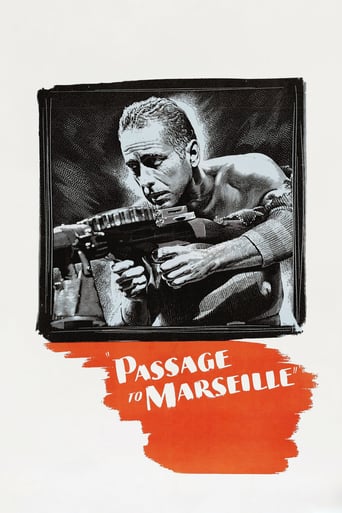Richie-67-485852
This fine cast makes the film come alive. Add dislike of the Nazis and love of country and you get an emotional movie making a point. What we forget is how many people died in that war and all the different stories that can be told none of them the same or alike but all unique. One wonders if the 50 million people who died of what difference their lives would have made if they lived. Dialog is good, acting on target and Directing holds up. I found it a little slow in the beginning but that is because I wanted to get to the convicts escaping part. The old man who sets up the escape has a story that tugs at your heart. Get snack, a tasty drink and.....
jacobs-greenwood
Directed by Michael Curtiz, reuniting several actors from Casablanca (1942), with a screenplay by Casey Robinson and Jack Moffitt that was based on a novel by Charles Nordhoff and James Norman Hall, this somewhat confusing war drama adventure recognizes the contributions of the Free French in Europe during World War II.Per an armistice signed with Germany, France and its people were divided - the Vichy were friendly with Adolph Hitler and the German Nazi party. This film tells a fictional story of five prisoners in France's Devil's Island who escape to fight for their country's freedom by joining a Free French bomber force, whose base of operations was in England. Humphrey Bogart as Jean Matrac leads Renault (Philip Dorn), Marius (Peter Lorre), Petit (George Tobias), and Garou (Helmut Dantine); all are initially assisted by a former Devil's Island prisoner, now resident butterfly collector with money, named Grandpere (Vladimir Sokoloff).The escapees make their way down a river and into the ocean where, after more than 20 days at sea, they are picked up by the freighter Ville de Nancy, which is on its way to Marseille with a cargo of nickel carbonate. The ship, which had been at sea during the political events which led to the armistice (preceded by the 'unthinkable' collapse of the Maginot Line), had a diverse set of Frenchman on-board including some which were for a free France, most notably its captain Patain Malo (Victor Francen) and passenger French military Captain Freycinet (Claude Rains), and others which were sympathetic to the Vichy, like Major Duval (Sydney Greenstreet), his ass-kissing yes-man Lieutenant Lenoir (Charles La Torre, uncredited), the ship's chief engineer (Edward Ciannelli) and radioman Jourdain (Hans Conried). A microcosm of the conflict in Europe plays out aboard the Ville de Nancy, including an attack by a German bomber that leads to Matrac's controversial killing of some (so called) 'innocent' plane crash survivors.The movie actually opens with a nondescript bombing run over the Rhineland, during which Matrac drops a love note to his wife Paula (Michele Morgan), followed by a journalist-war correspondent named Manning (John Loder) being escorted to the hidden Free French base in England. Manning then learns the story behind the Free French operation, and some of its men, from Freycinet which includes this aforementioned "passage to Marseille" via flashback. This flashback includes a subsequent flashback telling Matrac's (and Paula's) story.
Jeff (actionrating.com)
See it – This is more of an adventure movie, but it takes place during WWII, so we'll call it a war movie. The story is told in a flashback, and flashbacks within the flashback. Humphrey Bogart stars as a patriotic French convict who escapes from his island prison and journeys thousands of miles to help his country fight in the war. Adventures take place over land, air, and sea. The scene where Bogart is furiously firing his machine gun from the ship deck railing at attacking German aircraft is one the most iconic moments in early Hollywood history. I love watching WWII movies that were made while the actual war was still going on. This inspirational classic is heroic and tragic, yet full of hope. 2.5 action rating.
Casablanca3784
I suppose Warner Brothers was trying to make hay out of "Casablanca" which, in 1944 when "Passage" was filmed was still very far from becoming one of, if not the greatest American film;I say it was. Yes, as I viewed it thanks to Mr. Turner, I did feel a bit "Casablankish" but it was merely spotty, illusory but not serious. In no way can "Passage" compare to "Blanca" yet I found it, although a bit corny at times, quite entertaining. Bogart's cynicism, the linchpin of "Blanca" is quite obvious because his main duty was to get back to France to see Michèle Morgan rather than to fight Nazism while the rest of his fellow escapees from Devil's Island were true blue patriots. Vive la France and so on and so forth. Bogart, on the other hand, was framed by his "beloved" France which resulted in his sweating out the brutality of French Guyana in all its splendor. Although missing the incredible Ingrid Bergman, this film does offer some of the "Blanca Boys" such as Peter Lorre and Claude Rains. By the way, even though Lorre was an odd looking little guy, in real life he was one of Bogie's best friends thanks to his boozing and then losing money in card games.Some of the battle action at sea is interesting but as phony as phony can be--it's quite obvious those scenes were shot in a gigantic bath tub on the Warner lot.Incidentally if a reader hasn't visited Hollywood and taken a tour or two through the studios,allow me to tell you this as my wife and I were aboard a tram touring Universal Studios. Those wartime battle scenes at sea were actually shot using miniature ships and planes sailing in and hovering over large barrels of water.All in all, "Passage" could never be rated, at least by me, as BAD just by virtue of Humphrey Bogart's starring role. The guy didn't become an icon for doing nothing.



